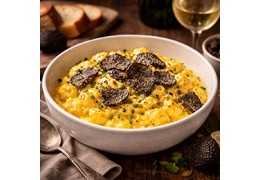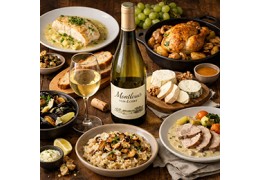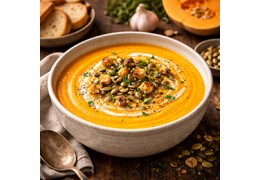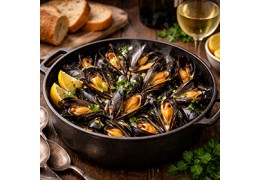Wine and food pairing: lasagne
The heart of lasagne lies in the balance between the meat, the acidic tomato sauce, the sweetness of the béchamel and the fat of the cheese. For this reason, a red wine with moderate acidity, silky tannins and fruity aromas is often the best choice to enhance the flavors while balancing the creaminess of the dish. However, some variations (vegetarian or ricotta lasagne) can also be paired with white wines.
Chianti is the classic pairing for lasagne bolognese. This Italian red wine, made from Sangiovese grapes, is characterized by lovely acidity, aromas of cherry, dried tomato, herbs and sometimes spicy notes. Its natural acidity is a perfect match for tomato sauce, balancing out the rich layers of meat and cheese. What's more, its moderate tannins and slightly spicy character add an extra dimension to lasagne.
Montepulciano d'Abruzzo, another Italian red wine, offers a more velvety texture than Chianti, with supple tannins and aromas of black fruits (blackberry, plum) and sweet spices. This wine is an excellent choice for lasagna dishes rich in meat and tomato sauce. It provides enough structure and freshness to contrast with the richness of the dish, while adding a certain roundness.
Valpolicella Ripasso, a Veneto wine, lies between Valpolicella Classico (light and fruity) and Amarone (more powerful). It offers great complexity, with aromas of ripe red fruit, plum, black cherry and chocolate. Its silky texture and well-balanced tannins make it an excellent companion for lasagne, particularly those prepared with a well-reduced tomato sauce and lots of cheese. Its slightly jammy, spicy side harmonizes well with the rich flavors of the dish.
The Nebbiolo, is another interesting option thanks to its great acidity and bright red fruit aromas (cherry, raspberry) with hints of sweet spice and licorice. Its natural freshness balances the acidity of the tomato sauce and the richness of the meat, while its supple tannins marry well with the creamy texture of the béchamel and cheese.
.For vegetarian lasagne, often with grilled vegetables (zucchini, eggplant, peppers) or spinach and ricotta, light white or rosé wines are generally more suitable.
A Vermentino is an excellent choice to accompany vegetarian lasagne. This dry white wine, with its aromas of lemon, Mediterranean herbs and stone fruit, brings a lovely freshness that complements grilled vegetables. Its invigorating acidity helps balance the richness of the béchamel and cheese, while remaining light on the palate.
.A rosé from Provence, with its aromas of fresh red fruits (strawberries, redcurrants), citrus and floral notes, is also a perfect option for light vegetable lasagne. It brings freshness and a delicate fruity side that harmonizes well with vegetables and cheeses, while remaining discreet enough not to dominate the dish.
.A Sancerre bio, a Sauvignon Blanc-based white wine, is ideal for ricotta and spinach lasagne. Its aromas of citrus, green apple and gunflint, as well as its minerality, bring an invigorating freshness that cuts through the richness of the cheese while respecting the delicate flavors of the vegetables. Its liveliness on the palate balances creamy textures without weighing down the palate.
White lasagne, without tomato sauce, often prepared with chicken or mushrooms and a creamy béchamel sauce, calls for rounder white wines or light reds.
A Burgundy Chardonnay, particularly a Pouilly-Fuissé, with its roundness, aromas of white-fleshed fruit, butter and sometimes hazelnut, is an excellent companion for white lasagne. This wine brings complementary richness to the dish while retaining a freshness and minerality that balances the cream and cheese.
A Côtes du Rhône Blanc, the Arbousiers du domaine de la Réméjeanne for example, often a blend of Grenache Blanc, Marsanne and Roussanne, offers aromas of white-fleshed fruit, flowers and honey, with a generous structure that pairs well with the creamy texture of white lasagne. It adds a fruity, floral touch that softens the richness of the béchamel and cheese.






